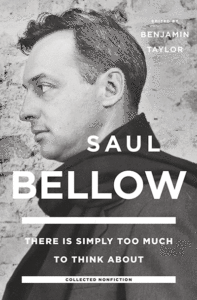There Is Simply Too Much to Think About: Collected Nonfiction, by Saul Bellow, edited by Benjamin Taylor, Viking, 544 pages, $35
Reviewed by NEAL GENDLER
Aptly named, Benjamin Taylor’s collection of nonfiction by Nobel-winning novelist Saul Bellow can seem like its title: 512 thought-provoking pages of Bellow on life, aspirations, disappointments, creativity and himself.
Taylor, a college teacher and award-winning author, provides a spectrum of Bellow’s topics, including a trip across a tense, weary 1948 Spain and a drive past miles of Illinois cornfields, where Bellow says one can “recall Joseph’s brethren in the lean years and think how famine has been conquered here and superabundance itself become such a danger that the government has to take measures against it.”
Some pieces sparkle, among them the brilliant 1983 “In the Days of Mr. Roosevelt,” which resurrects the feeling of the Depression and analyzes FDR’s effect on a traumatized nation.

Some disappoint, among them “On Jewish Storytelling,” which too much discusses Jews writing in one place or language instead of another. Some are long contemplations of the writer’s craft, difficulty and social position. A virtue of this extensive compilation is that a reader uninterested in one piece can quit and turn to the next.
Other than “Prologue: Starting Out in Chicago,” the pieces are organized by decade. Dates given at the end of each piece would be more helpful, for context, at the beginnings.
The prologue, written in 1974-75, dispenses with the “Jewish writer” question.
“I thought of myself [in 1930s Chicago] as a Midwesterner and not as a Jew,” says Canada-born Bellow, who lived from 1915 to 2005. “I am often described as a Jewish writer; in much the same way, one might be called a Samoan astronomer or an Eskimo cellist… I am a Jew and I have written some books. I have tried to fit my soul into the Jewish-writer category, but it does not feel comfortably accommodated there.”
Yet Bellow’s writing includes Jews, and several pieces in this book have Jewish topics. One of the brightest is “Israel: the Six Day War.” Datelined “Tel Aviv, 12 June 1967,” its sunny, optimistic aura can be hard to recall now.
His 1979 piece about the Begin-Sadat ceremony and White House lawn party is astute, including delightful cracks about “the eminent persons who went about recognizing one another” and “many celebrities [who] embraced enthusiastically, grappling affectionately, kissing one another.”
Bellow regrets not being an expert but shows understanding he claims to lack. “What is fundamental… is the need for a political-military solution,” he says. “Since the revolution in Iran, the facts are clear for all the world to see. A complete victory of radical extremism in the Arab world would mean the defeat of all Jewish hopes, the end of Israel.”
But foreign politicians, take note: “Human beings have lived for many thousands of years in the Middle East and in that time have created complex difficulties, beliefs bewilderingly similar and for that reason utterly dissimilar, hatreds and profound needs that cannot be conjured away,” Bellow says. “What footing rationality can find in these infinitely contorted desires and antipathies… remains to be seen.”
Some of the most captivating pieces are Bellow talking about his life and work. The 1975 “An Interview with Myself” includes an anecdote about accepting an award from Chicago Mayor Richard J. Daley for Herzog, which Daley hadn’t read. “Art is not the mayor’s dish,” Bellow says. “I much prefer his neglect to the sort of interest Stalin took in poetry.”
He pokes fun at traditional literary culture in the witty “A Jewish Writer in America,” saying: “If the WASP aristocrats wanted to think of me as a Jewish poacher on their precious cultural estates, then let them.”
“Deep Readers of the World, Beware” mocks those unable to let a story be a story, reading into novels deep meanings that may have nothing to do with what the writer intended.
The title is taken from an insightful 1992 lament about the low state of public knowledge, conceding that understanding everything going on is “hopeless — too many kinds of special preparation are required.” So people don’t try, which “is what makes packaged opinion so attractive.”
That’s something to think about.
***
Neal Gendler is a Minneapolis writer and editor.
(American Jewish World, 5.8.15)




















Comments 0